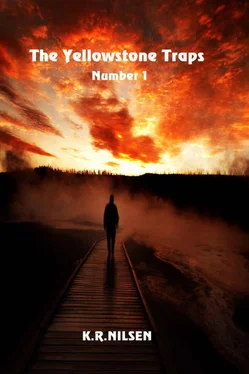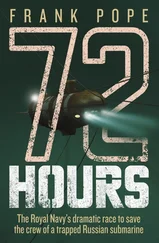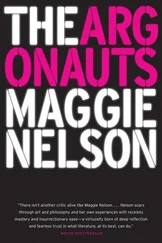“Two men came here and opened fire on us. One of them was Andy Regas. My daughter was stuck down by a bullet. She bled to death in an hour. Why?”
“Where is Andy?” Harland whispered.
Abel grabbed a chair, lifted it, and winged it into a far corner of the room. “Who gives a good goddamn where he is? What did you have to do with this?”
“Nothing,” Harland stammered. “I haven’t seen Andy in weeks.”
Spittle spurted from Abel’s mouth. “Farmer, I’m a man of principle. I want to beat you to within an inch of your life. But that’s not possible. I’m sworn never to strike a person in anger.”
Abel kicked a chair out of his way to vent frustration.
“A month ago I come to your doorstep to talk to you and took a shotgun blast an inch from my ear.”
“That was Andy’s doing.”
“Yes, and you held a gun me, too.”
“Maybe I did, but I could no more hurt you than you can hurt me.”
“Enlighten me, will you?” Abel rumbled sarcastically.
“I’m a Christian man, raised up with the good book over me. I believe in the good in people.”
“You do, do you?”
“Me and Eda, we took Andy in. He needed care, some tough love, and guidance that only Jesus can provide.”
“Then why all this?” Abel spread his arms to encompass the carnage throughout the room.
“Andy had always been trouble, ever since he came to us. I worked the boy hard on the farm to try to straighten him out, but I couldn’t reach him, not much anyway. Just a week or two ago, I found him butchering out some of your animals.”
“Our milking goats.”
“That’s what they were. I told him then and there to leave you people alone. We didn’t have a quarrel with you no more. I needed him to help put off the National Guard that was coming, so we could hold on to the grain in the silos. But he didn’t show.”
Abel turned to face out the devastated window, drinking in the fluttering aurora colors but taking no delight in them. “He didn’t come into Sweetly to assist you?”
“No.”
“He could not have made it.”
“I see that now; he was here. I had no idea. I don’t know what to say.”
“Harland, your son didn’t come to your aid in Sweetly because he lost his life here.”
“That’s not so.”
“He perished in Big Stone Lake.”
“No.”
“He died of hypothermia in the icy water.”
The farmer shuttered and took a seat on one of the chairs, head bowed forward. The color circus of the electric magnetic radiation played over his slumped form, painting his body with Fauve pigments. For a full minute he stared at the wasteland of the meeting hall floor before drawing a breath to speak.
“Everything’s come to no good.”
Chapter One Hundred-Thirteen
Asegmented waterborne creation strained against the biting prairie wind hustling over Big Stone Lake. A stubby open steam craft with a simple canopy covering a rudimentary steam boiler labored on the waters, trailing puffs of wood smoke. To keep the craft’s steam-driven propeller shaft spinning, Max fed split logs into the steamboat’s tiny firebox one by one.
The little craft was a tow vessel pulling a hastily rigged raft comprised of canoes and kayaks lashed to a rough timber frame supporting a pine board deck and gunwales. The deck of the little barge held stacked crates loaded down with fresh foodstuffs harvested by many hands at Independency and shuttled down to the lake. All the goods rested securely under blankets and tarps to prevent the cold from freezing the perishables. Half a dozen crew members from the bluffs rode aboard the contraption. Winnie joined Abel and the others on the slow voyage to Sweetly.
Harland stood forward, brooding, hands clasping a canopy post, scanning the south shore of the lake for signs of a pulse within Sweetly’s architecture. The bonfire, lit behind the Sweetly Primary School and kept going so many days and nights, had cooled to weak embers, giving off a lacy curl of colorless haze.
Etching the anemic sky above the schoolhouse, the soaring concrete columns of the Sweetly Coop grain elevator silos filled the farmer’s sightline. The ruined towers disgorged fat streamers of white smoke boiling up from smoldering grain fires hidden deep within the recesses of the cement cylinders.
The image of the burning silos triggered a wave of nausea in the farmer, every pore on his face and hands opening and disgorging a soaking sweat, as if the sight of the violated towers were poison and the body mustered last-ditch defenses to flush itself free of the toxin. The smoking hulks were eerily familiar, akin to media footage of the World Trade Center towers burning in Lower Manhattan more than two dozen Septembers in the past.
To blot out the smoke banners above the lake, the farmer lowered his chin to his chest and clasped a hand over his eyes. Abel noticed and inched over the narrow deck to have a word with him.
“What is it, Harland?”
“Nothing,” the farmer croaked.
“Not a pleasant a sight, those towers.”
“No, they ain’t.” Harland extricated his face from his hand to reveal clenched teeth. “Those silos are my whole existence out there, going up in smoke. They’ve been a part of my days ever since I can remember. From the farm, you can see them in the distance, always there, all the time. They’ve never looked anything like that.”
Harland dug his fingernails into his scalp as if to pull the hair out by the roots. “I never once spent a summer when I wasn’t in the field, driving a tractor under those things. My earliest recollection—maybe three or four years old—is sitting on my father’s lap on his John Deere, out in full sun, wind in the face, side-dressing corn. Not talking much, no. Just sitting with my dad’s long arms around me and not wanting to be anywhere else.”
“That’s a fine memory.”
“It is. But it’s gone, mister. There’s your proof, right there, in those silos. There’ll be no more plowing Plains earth.”
The farmer craned his head about and glanced at the bluff country receding far behind the steamboat. Abel followed his eyes.
“You come along, then, and you got a whole other life up there on the bluffs.” Harland stretched an arm and pointed a finger to the north. “You’re doing some interesting things there, really. I never figured on it. But that’s not my world. Corn is my world. To raise corn is to be who I am.” Harland tapped his chest with his fingers. “We’re one and the same, you know. You can’t separate this man from the cob. Impossible! My skin is cornhusk; feels just like it. My hair is white as corn silk. You take a dry corn kernel, and, why, it’s as hard as teeth.”
Abel listened intently to Harland’s spin, nodding to encourage the man to bring his pain up from the gut and get rid of it.
“All corn ever needs is sunshine, see, a good soaking every week or two, good river bottom soil, summer heat, and it grows and grows. When there’s good growing, you just can’t believe your eyes what you’ve done. For a mile this way and that way it’s just green, green, green. There’s so much food packed in that section that you can feed a thousand people or a hundred head of cattle for a year.
“Sometimes it’s bad. Hail comes down big as a fist; a twister cuts out the south corner acreage; it don’t rain for so long the corn stalks just shrivel to tinder sticks, they’re so dry. Life’s that way, you know, good years, bad years. No different. But it’s done. Good or bad, it’s finished.”
The farmer spit in the lake and watched the wet foam recede behind the boat.
“I never seen one minute when I didn’t know what to do with myself. Walk out the front door and I knew just where to plant my feet. If it was eleven in the morning, I knew what I’d be doing; if it was late in the afternoon, same thing. Everything fit. Everything worked. Like the heart, you know. The heart knows its job, knows it so well it never pauses to consider what it’ll be doing. Same with me.”
Читать дальше










